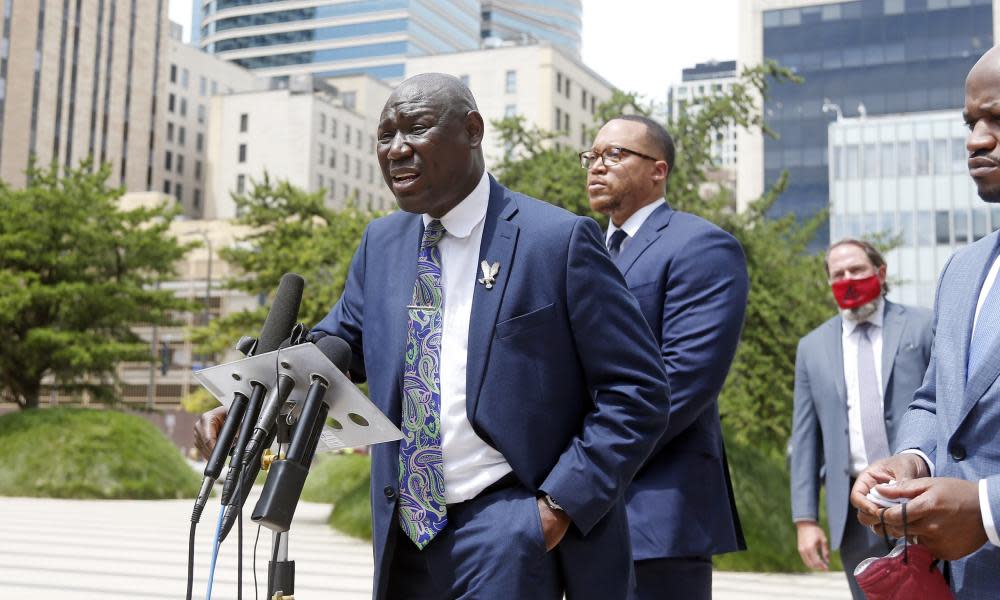George Floyd's family sues Minneapolis over police killing

The family of George Floyd has filed a lawsuit against the city of Minneapolis, seeking damages for Floyd’s killing by the police.
The lawsuit, filed in US district court in Minnesota, also names the four officers involved in Floyd’s death on 25 May, including Derek Chauvin, who knelt on Floyd’s neck for nearly nine minutes and has since been charged with second-degree murder.
Floyd’s death sparked protests in Minneapolis that spread across the US and beyond and intensified calls for defunding and major reform of police departments.
Lawyers for Floyd’s family said on Wednesday they had sued the city of Minneapolis for its role “as the responsible party for the Minneapolis Police Department”. The attorneys argue the city is responsible for practices and culture of policing that led to Floyd’s death.
Related: George Floyd told officers 'I can't breathe' more than 20 times, transcripts show
“This complaint shows what we have said all along, that Mr Floyd died because the weight of the entire Minneapolis Police Department was on his neck,” said Ben Crump, one of the attorneys who filed the lawsuit.
“The city of Minneapolis has a history of policies, procedures and deliberate indifference that violates the rights of arrestees, particularly black men, and highlights the need for officer training and discipline.
“This is an unprecedented case, and with this lawsuit we seek to set a precedent that makes it financially prohibitive for police to wrongfully kill marginalized people – especially black people – in the future.”
The lawsuit alleges that Floyd was deprived of his constitutional rights when he was restrained by Chauvin and assisted by three other officers as they tried to arrest him in the city in May: Thomas Lane, J Alexander Kueng and Tou Thao.
Lane, Kueng and Thao have been charged with aiding and abetting both second-degree murder and manslaughter. Lane held Floyd’s legs and Kueng was at Floyd’s midsection as Chauvin restricted his breathing. Thao warned off bystanders as they tried to intervene.
The complaint asks that a body is appointed “to ensure that the City of Minneapolis properly trains and supervises its police officers”, and that Floyd’s family be awarded compensation by a jury.
News of the lawsuit comes after Donald Trump further stoked racial tensions in the US this week, when he seemed to play down the plight of black people at the hands of police.
In an interview aired on Tuesday, Trump claimed more white people were killed by law enforcement, even though numerous studies have found black people are more than twice as likely to be killed by police in the US.
The president had pivoted when asked about the continued killing of black people by law enforcement officers.
“And so are white people. So are white people,” Trump immediately said in response. “What a terrible question to ask. So are white people. More white people, by the way. More white people.”
Meanwhile, on Wednesday, a court in Minneapolis allowed media and members of the public, by appointment only, to view body-camera footage from two of the officers involved in Floyd’s death, although not to broadcast it.
Related: 'Make it stop': George Floyd's brother calls on Congress to act over police violence
The footage captured a panicked and fearful Floyd pleading with the officers in the minutes before his death, saying “I’m not a bad guy!” as they tried to wrestle him into a squad car.
“I’m not that kind of guy,” Floyd says as he struggles against the officers. “I just had Covid, man, I don’t want to go back to that.” An onlooker pleads with Floyd to stop struggling, saying: “You can’t win!” Floyd replies: “I don’t want to win!”
A few minutes later, with Floyd now face-down on the street, the cameras record his fading voice, still occasionally saying “I can’t breathe”, which were his last words, before he goes still.
The recordings from officers Lane and Kueng are part of the criminal case against them.
The footage shows the officers’ view of a death already widely seen on a bystander’s cellphone video.
The Associated Press contributed reporting

 Yahoo News
Yahoo News 
